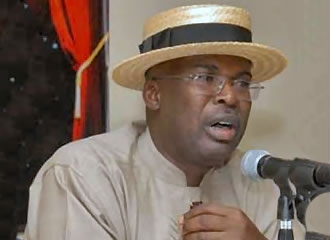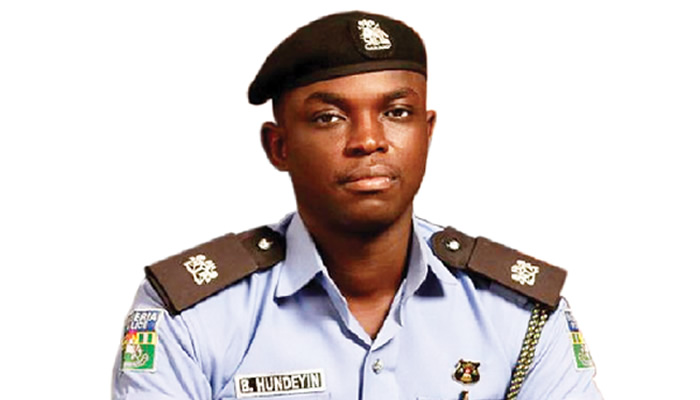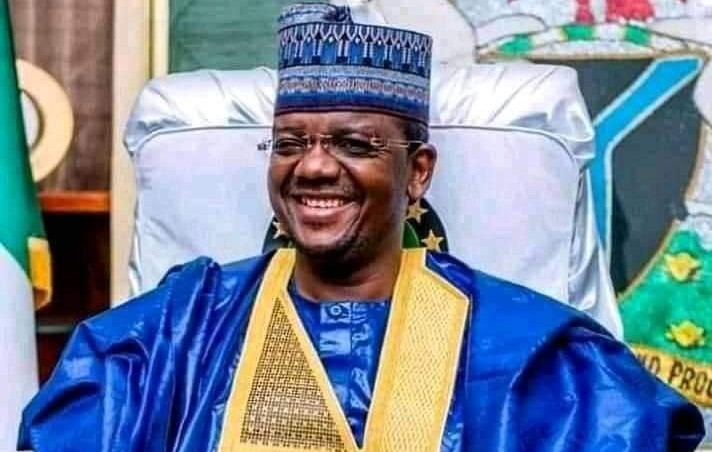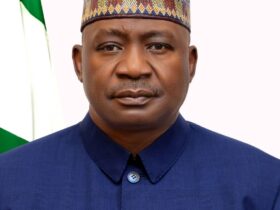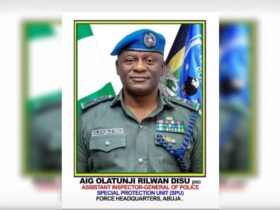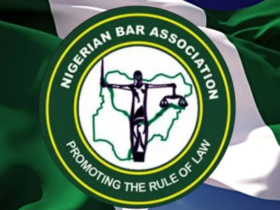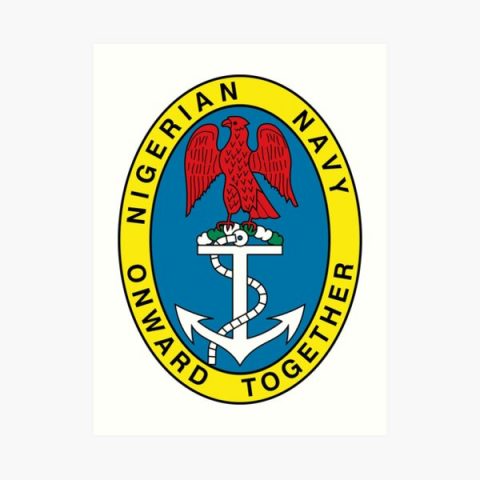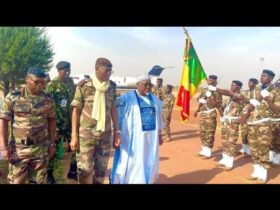The Lagos State Police Public Relations Officer, SP Benjamin Hundeyin, speaks with DEJI LAMBO on protests within the state, its attendant complications and the use of minimal force to disperse protesters
Since the #EndSARS protests and the unrest and destruction that followed, it appears that it has become an offence for citizens to carry out their legitimate rights of protest in Lagos State. Why is this so?
The Lagos State Police Command has not clamped down on any set of peaceful protesters; the only people the police will always have issues with are protesters who have decided to infringe on the fundamental human rights of other Nigerians by blocking the road, infringing on their freedom of movement, and by sometimes assaulting other people. Those are the people we have issues with. As long as you go on a peaceful protest, nobody will touch you.
There are many examples in Lagos where people go on peaceful protests; pensioners and retirees go on processions, and nobody touches them because they don’t disturb public peace. It is wrong to say we are waging war on peaceful protest; we only try to ensure that nobody infringes on the rights of others.
During the last protest held at Gani Fawehinmi Park by Yoruba Nation agitators, a stray bullet from policemen allegedly killed a salesgirl, Jumoke Oyeleke. Shouldn’t the policemen have exercised a peaceful approach to dispersing the protesters to avoid casualties last Monday?
Whenever we engage civilians, the major thing we focus on is reducing casualties because if we have zero casualties, the better for us. But the force that we use to respond to any threat will be commensurate with the gravity of the threat. During the #EndSARS anniversary at the Lekki tollgate last year, protesters were dispersed with tear gas and water cannons, and not one round of ammunition was fired.
In a case where the threat is such that the lives of police officers are in danger, we have to upscale our response and use our firearms if need be, especially when the lives of our officers are in danger, and that is when you have enough ground to use your firearm. So, during the Yoruba Nation rally, the agitators started firing our officers, and two officers got injured and vehicles were destroyed.
So, the lives of our officers were in danger; if we did not respond appropriately, then we would have lost some of our officers. I don’t have details about the one you were talking about last year, the Jumoke Oyeleke’s case.
Multiple eyewitnesses at the Yoruba Nation rally confirmed that the agitators were peaceful and that it was when a policewoman gave the order for them to be cleared that everything degenerated. Why attempt to clear a peaceful protest?
You can’t have people carrying guns; other people who were passing saw them carrying guns, and as good Lagosians, they called the police to inform us that they saw some men carrying guns and that they don’t feel safe as they believe something was going to happen if it was not looked into.
We approached there and realised that some men were gathered and armed. What any reasonable police force or police department anywhere in the world would do is disperse such a gathering because, to start with, the law does not allow you to disturb public peace. The mere fact of standing in a public place with firearms disturbs public peace, and that was confirmed when people called in to say they saw men with guns and panicked. In the same way, Nigerians would complain when they saw policemen in muftis carrying guns and feel like maybe they were armed robbers.
So, it remains our duty to disperse such a crowd. And naturally, somebody armed and likely to be dispersed will most likely be tempted to use his firearm, and at that point, they will fire at the police.
In the space of one or two months, policemen in Lagos State have been responsible for the deaths of about five Nigerians, including Bolanle Raheem, Gafaru Buraimoh, and the two persons alleged to have been killed on Monday. How do you react to this, especially when members of the public that policemen have sworn allegiance to protect are now the victims?
Only one person was killed on Monday; the agitators had camera phones and took pictures and videos with them. If you check, all they showed was one body. If they are claiming two persons died, we want to see a picture of that body the same way they showed us one. Also, of all the deaths you mentioned, I have yet to see one that was deliberate.
In the case of Bolanle Raheem, there was no point in saying that the policeman threatened that he would fire her, and he deliberately fired. We spoke with the late lawyer’s sister, who was in the vehicle with them, and there was no point at which a police officer that has sworn to protect Nigerians decided that “of my own free will, I want to take your life,” and he took the person’s life. All of the cases you have mentioned concern the misuse of firearms by not taking proper precautions in their use.
And that is not an excuse; in all of these cases, I know for certain that the officers involved in the cases of Raheem and Buraimoh were not let off the hook. For the ASP, he is in Ikoyi Prisons, and for Inspector Imeh, who was responsible for Buraimoh’s death, is still in detention, we are awaiting his dismissal so that we can prosecute him.
The #EndSARS campaign arose from the anguish of what civilians described as the repressive action of the police against them, among other reasons; it, however, degenerated, and we all saw the attendant consequences. A few years after #EndSars, the killings, brutality, and extortion of Nigerians by the police have continued unabated. What lessons has the police force learnt in the dispensation of its duties to members of the public, especially as Lagos was the epicentre of the protest?
We’ve learnt not to let protests fester to the point where miscreants hijack them and wreak havoc for everyone, including innocent bystanders, children of police officers killed in the barracks, business owners whose stores were looted, and so on.
So, we have learnt that when it is a peaceful protest, they will remain peaceful, but the moment it degenerates into another thing, where people could infiltrate and hijack the protest, we will not let things get to that point. If we want to be sincere with ourselves, things have been improving. If we are to go by statistics, the attacks, extortion, and harassment have been on the decline.
The police are going through a reform process, and I don’t expect anybody to want to see the police change things that have been happening for over a decade in just a year. The reforms have begun, and the president is providing much-needed support. As we have the police trust fund and the Police Act has been amended and passed into law, things are improving, and we must thank Nigerians for joining us in the fight to improve the police by reporting incidents that allow us to take appropriate action. We also appreciate the Police Service Commission for always doing its part in the discipline of officers.
Is it legal for police officers to shoot and kill people who exercise their constitutionally protected right to protest, even if their actions are peaceful?
Definitely not; as for the protest by the Yoruba Nation on Monday, I don’t know why it is difficult for Nigerians to see that those people shot police officers, shot at police vehicles, and burnt a vehicle. Those people are not protesters.
Why does the police hide under the cover of the statement ‘hoodlums hijacked the protest’ to justify its action of using what it mostly described as “minimal force,” a process that is mostly accompanied by shootings and spraying tear gas, which usually, except on a few occasions, results in injuries and deaths?
What you just said is an unfounded allegation; we don’t hide under anything, we say it as it is. If they are protesters, we say they are protesters, but if the protests get hijacked, they get hijacked. The leaders of the #EndSARS protest will tell you that they did not loot Shoprite, and that is confirmation that the people who did the looting infiltrated their protest. So, when we say that hoodlums hijacked the protest, we say it because that is the fact.
So, what are the parameters the police use in determining when hoodlums have hijacked a protest?
The #EndSARS protesters were there for days and nobody touched them, but if you go online, you will see videos of them going into people’s businesses and looting their shops. As a result, you don’t need to be told that the protest was hijacked. Even sometimes, the protesters themselves cry out that they are seeing strange faces among them.
But the major unrest during the #EndSARS campaign started when security agents stormed the Lekki tollgate to clear the protesters…
I’ve said my piece; I don’t want to argue. I have answered that question.
To a layman, can you interpret what using minimal force means when dispersing protesters?
Our response to any threat would depend on the gravity of that threat, so for people who are not holding any arms, if we have to disperse them, it is probably because they are blocking the highway, and minimal force will be to tell them verbally by saying, “Please leave the highway; you are blocking the road.” But if they refuse to listen to the verbal persuasion to leave the road, the minimal force would be required to disperse them with tear gas.
As for the Yoruba Nation agitators who came to Ojota, Lagos, armed with pump-action rifles to shoot at officers, the minimal force would require dispersing them with teargas, and for people who make desperate attempts to kill police officers, and the police officer life is totally in danger, and there is no other way to escape the danger, the minimal force will be firing at them to maim them, and if that person dies in the process, it is OK under the law. So, minimal force is relative, depending on the gravity of the threat.
Is there a likelihood that any of the policemen involved in the killing of two Yoruba Nation protesters last Monday at Gani Fawehinmi Park will be identified and prosecuted?
I cannot answer a question that implies that the police killed when that was not the case.
Is there a possibility of identifying and prosecuting the killers of the Yoruba Nation protesters last Monday?
I said that day that an investigation had commenced into that case, but the police did not kill that man.




